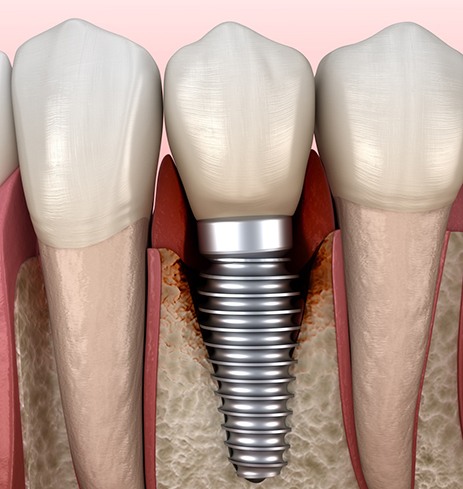Dental Implant Failure & Salvage Dumfries
Saving Your Renewed Smile
Dental implants in Dumfries are consistently successful. In fact, they thrive in more than 95% of cases. Rarely, though, circumstances arise that can cause them to fail. If you ever suspect that something is amiss with one of your implants, get in touch with us right away to request an appointment here at Oral & Facial Surgery Center of Virginia. We will thoroughly evaluate the situation and design a treatment plan to get your smile’s health and function back on track as soon as possible.
Why Do Dental Implants Fail?

The most common cause of a failed dental implant in Dumfries is an infection known as peri-implantitis. It occurs when bacteria attack the tissue around an implant, eventually causing so much damage that the jawbone and gums are no longer able to support the prosthetic tooth root. Poor oral hygiene often plays a role in the development of this sort of infection.
Other possible causes of dental implant failure include:
- Traumatic injury
- Failed osseointegration (the implant never bonds with the surrounding bone)
- Various medical conditions, such as some types of cancer
Symptoms of a Failed Dental Implant

Dental implant failure can occur at any time, whether it is weeks, months, years, or even decades after the original surgery. That is why you should always monitor your oral health and take note of any possible signs of a problem.
Here are some symptoms that point to the need to visit a qualified oral surgeon:
- Pain. Some soreness is normal after the initial implant placement surgery. However, severe or prolonged pain is a sign that something is wrong.
- Signs of infection. Abnormal swelling, bleeding, pus, receding gums, and a bad taste in the mouth could all indicate the presence of an infection.
- Difficulty eating. After you adapt to using your implants, you should be able to enjoy virtually any food with ease. Problems in this area indicate the need for professional assistance.
- An implant feels loose. In some instances, a loose-feeling implant is a problem with the restoration, rather than the implant itself. In other cases, the problem is more serious and indicates that the implant is failing.
How Dental Implant Salvage Works

Contact us as soon as you notice that something is off with your implants. The earlier you seek care, the more likely it is that the issue can be resolved without extensive or invasive treatment. During your appointment, we will thoroughly examine your mouth before we recommend your next steps
In some cases, a relatively simple solution, such as antibiotics, is all that is necessary. In other instances, a failing implant must be removed altogether. Later, after a healing period (and potentially a bone graft), it might be possible to insert an entirely new implant.

